
Working life and job satisfaction
Despite the enormous upheaval and insecurity faced by some during the pandemic, for many actively employed project professionals working life has remained unchanged.
However, it’s clear that coronavirus has impacted many – both in financial terms (volume and security of work) and in how they view the future prospects for themselves and their organisations. General optimism levels – in terms of the supply of jobs, organisation growth and personal prospects – have all been hit during a turbulent 12 months.
For those directly affected by the pandemic, the fallout has been significant. Seventy per cent of those who found themselves unemployed after the start of the pandemic say the virus was either to some extent or completely responsible. And while future research will give us a better sense of how deep and wide this trend truly goes, it’s fair to say that as the pandemic enters its second year the impact on confidence across the board has been severe.
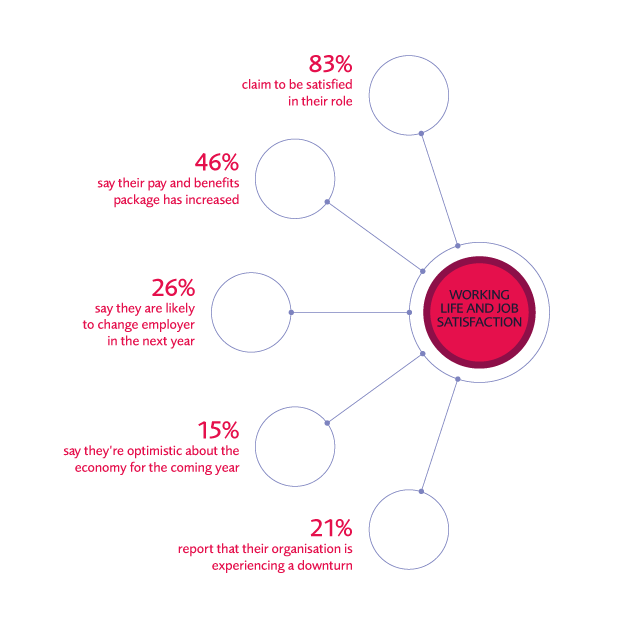
Interactive chart - make your selection to view the data and compare results
Employment status
Although flexible and remote working has come to the fore over the past 12 months, there has been little change to the overall picture of employment status: 82 per cent of those questioned say they are in permanent employment. Overall, 85 per cent say their status remained unchanged even as the pandemic struck (see next page); six per cent reported going on furlough before returning to normal hours, while two per cent worked reduced hours. This compares favourably with the overall national picture, which shows that 37 per cent of employers had staff furloughed at 30 November 2020 under the Coronavirus Job Retention Scheme, and 13 per cent of employments were furloughed.
The picture changes somewhat when looking at those working on a contract basis and particularly the self-employed. While 70 per cent of contractors report no change, 10 per cent saw a change to their contracted terms, with a further nine per cent having contracts cancelled before finding other work. As for the self-employed, more than a third (35 per cent) reported a drop in the volume of work since March 2020.
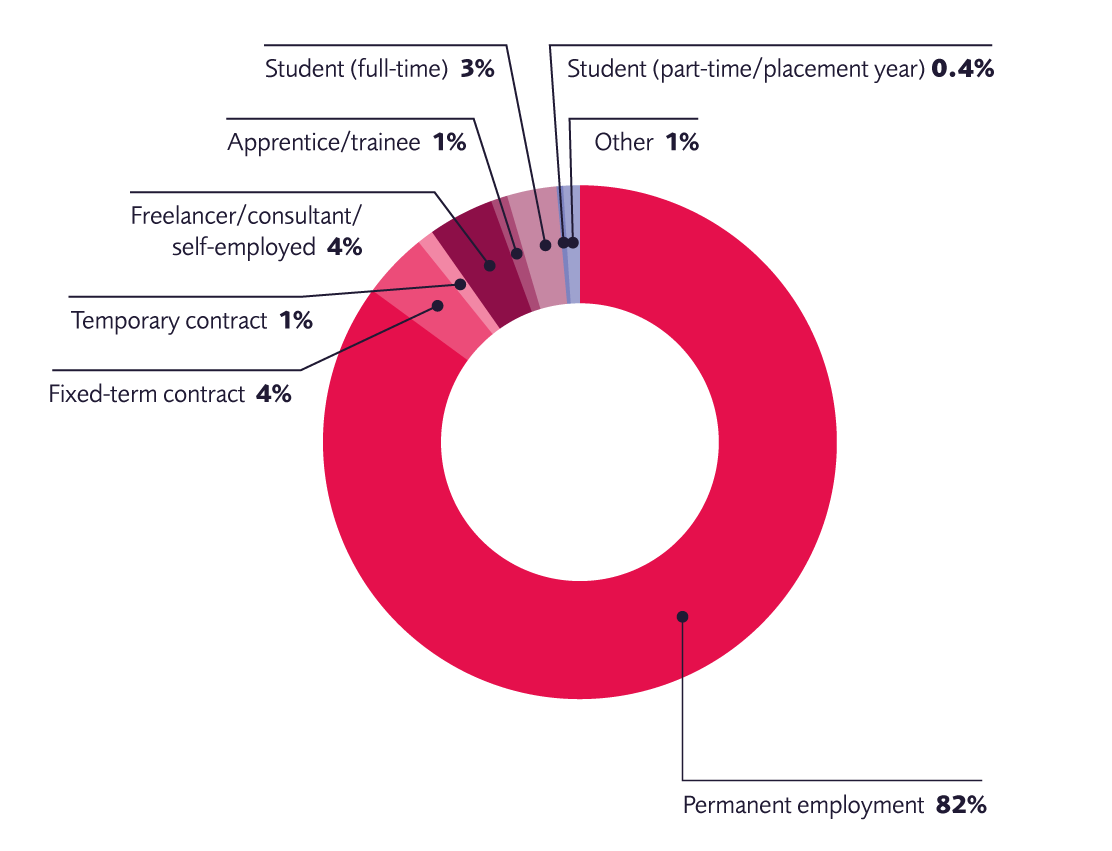
Job satisfaction
Measuring the overall levels of satisfaction gives us a snapshot of how those in the profession are feeling about their chosen career. Remarkably, given the enormous challenges that the coronavirus pandemic and Brexit have presented, professionals remain broadly satisfied: 83 per cent of project professionals report feeling satisfied with their role, compared with 82 per cent the previous year. Indeed, the proportion of those feeling very satisfied rose from 24 per cent to 28 per cent.
A closer look shows that the levels of satisfaction remain exceptionally high among those in permanent employment, at 84 per cent, perhaps reflecting the value many are placing on security and stability in uncertain times. Conversely, flexibility and variety are now less valued. Last year freelancers and the self-employed reported the highest levels of satisfaction, at 86 per cent. They are now the least satisfied, with a net satisfaction score of 80 per cent.
Unsurprisingly, those who have had their working lives disrupted, either through temporary leave or furlough, or by changing working arrangements, report lower levels of satisfaction. Younger professionals lead the way in satisfaction levels: 89 per cent of 18-to-24-year-olds say they’re happy. That drops to 82 per cent for those in the 55-to-64-year-old bracket.
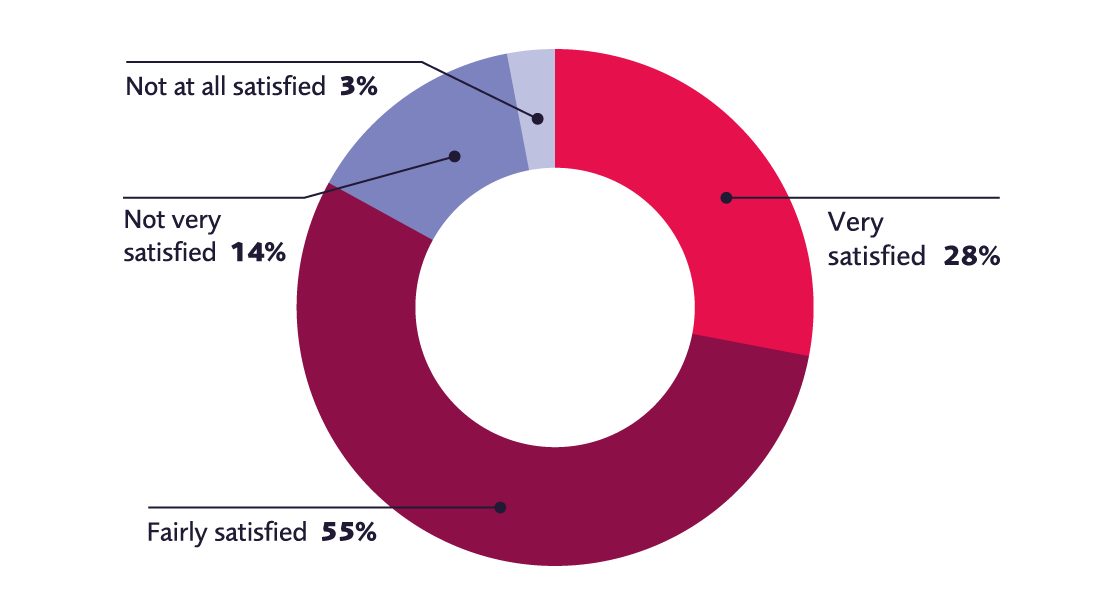
Supply of jobs
Quite how the next 12 months will play out is still unclear, and that uncertainty is reflected in a variety of ways, not least in expectations around the supply of jobs in the coming years. The proportion of those expecting that supply to continue unchanged dropped to 78 per cent from 83 per cent last year, with optimism levels especially dented among the newest entrants to the profession (78 per cent of 18-to-24-year-olds now say they expect the supply to be buoyant, versus 88 percent last year).
But it should be noted that despite coronavirus and Brexit, more than three-quarters remain positive about the near-term prospects. But there are clearly causes for concern, not least the uncertainty and aftermath of the pandemic. Four-fifths(81 per cent) of those who said they were pessimistic about the supply of jobs believe the coronavirus pandemic is at least partly to blame.
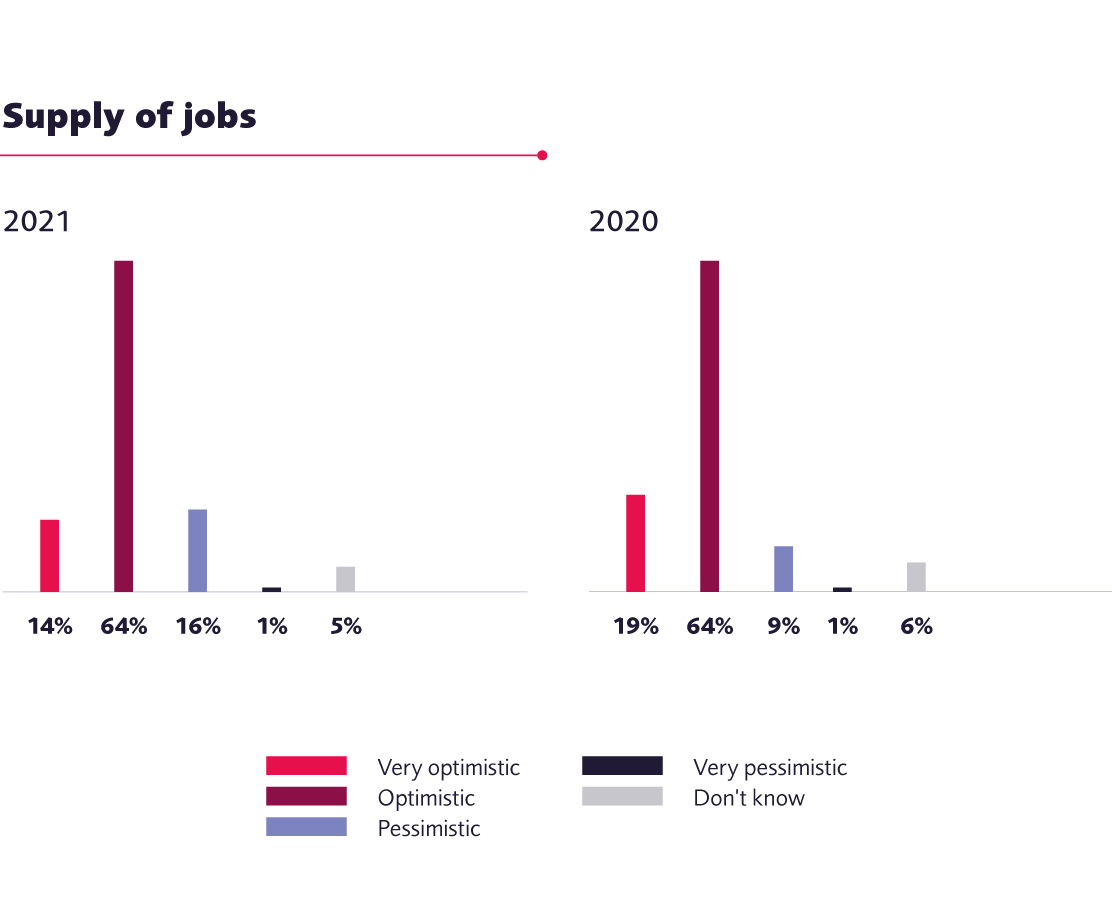
Organisational growth
The overall economic picture for project professionals has worsened over the past 12 months. After two years of positive results, fewer respondents now say their employer is planning to grow while more report that their organisation is experiencing a downturn.
The proportion reporting that their organisation is looking to recruit has decreased significantly from 51per cent last year to 41 per cent. This is due to significantly more reporting that their organisation is experiencing a downturn and making redundancies (increasing from nine per cent last year to 17 per cent). Of those whose said their employer is making redundancies, the majority claim it is as a result of the coronavirus pandemic (91 per cent).
The regional picture gives more details: plans to grow through recruitment have dropped significantly in Wales (53 per cent last year; 38 per cent this year) and Scotland (54 per cent last year; 36 per cent this year).
However, while they may not be planning to recruit, a sizeable majority (66 per cent) of Scottish professionals remain positive about their organisation’s future growth overall, a sentiment shared by those in the South West (72 per cent) and the North East (67 per cent).
As for the sectoral split, respondents working in aerospace (19 per cent last year; 52 per cent this year) and energy and utilities (11 per cent last year; 26 per cent this year) reported a downturn in activity as well as their organisations having to make redundancies. Central government, on the other hand, saw higher levels of optimism, with 62 per cent expecting to see increased growth and recruitment – perhaps reflective of government’s role in the post outbreak rebuild.
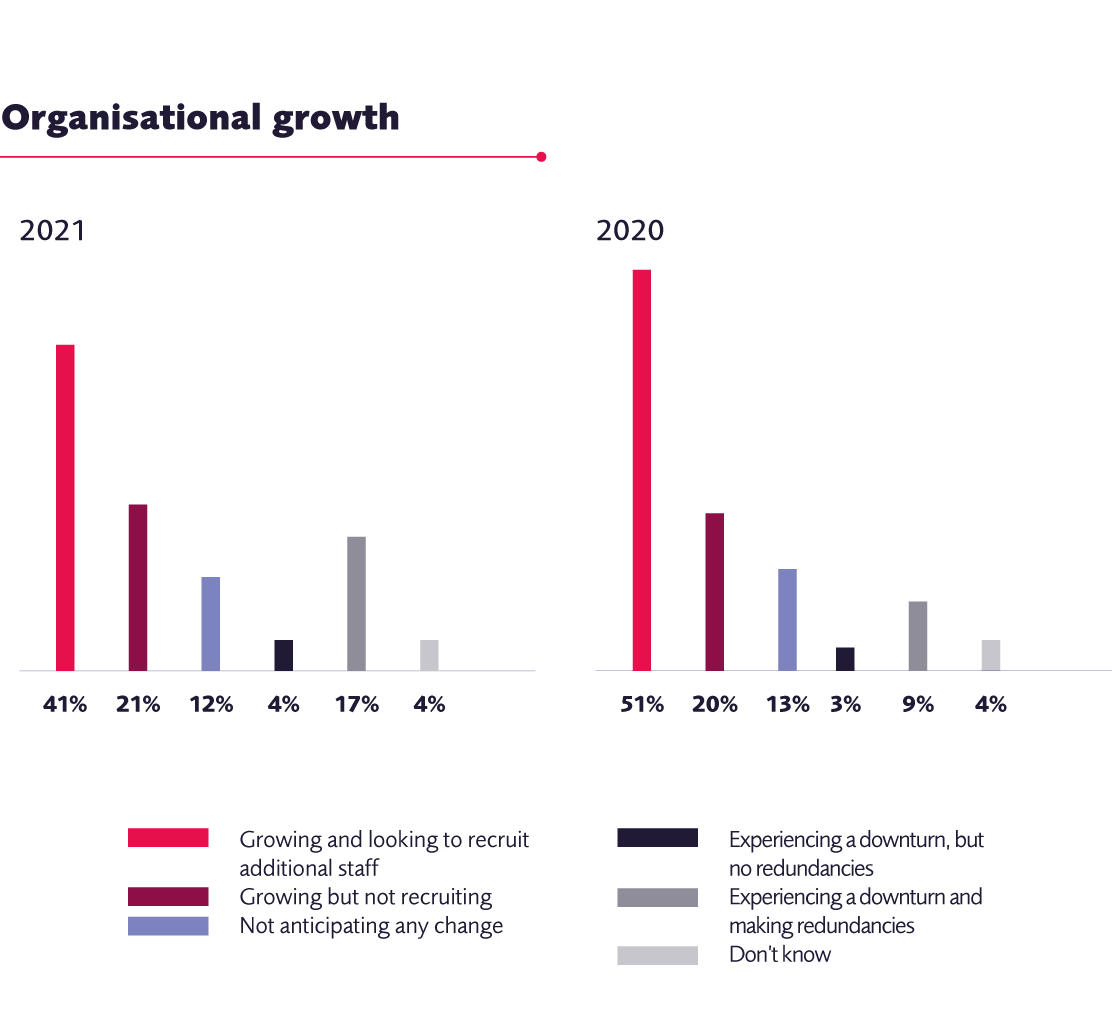
Change of employer
Given the extraordinary disruption brought about by coronavirus, it’s not surprising that the number one priority among project professionals is security. The survey shows that far fewer project professionals are likely to change jobs in the next 12 months – falling from 34 per cent last year to 26 per cent this year.
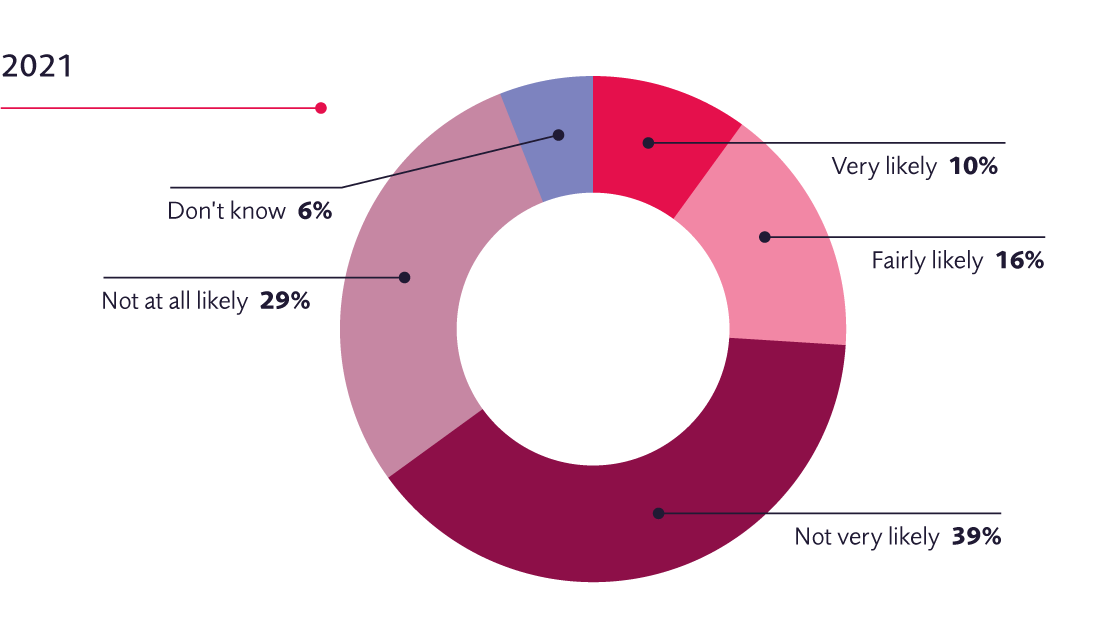
Looking at the figures in detail, those in the younger age brackets are now more likely to stick with their current employment, with a significant proportion of those aged 18-to-24-years-old not looking to change jobs over the next 12 months (down from 35 per cent last year to 23 per cent).
Tellingly, insecurity is affecting everyone: 71 per cent of consultants – perhaps the most likely to change jobs in a typical year – are staying put because they say now is too risky a time to change employers due to the pandemic and the resulting economic downturn. The relatively high rate of job satisfaction is also a factor, with 88 per cent of consultants saying they were happy with their current role and 12 per cent unsatisfied.
Job hunting criteria
Despite the understandable reluctance of many in the profession to consider moving jobs in the current climate, for some the temptation to change is too great. For those anticipating a move, the two main motives are simple: desire for a better salary and the desire for a new challenge, both selected by 54 per cent of respondents.
There has been a significant drop in the proportion rating location as an important factor when looking for a new job (down from 69 per cent last year to 60 per cent), possibly due to the pandemic. Instead, job security (51 per cent last year; 60 per cent this year) and working from home options (52 per cent last year; 61 per cent this year) have increased in importance as workers make the shift to remote working.
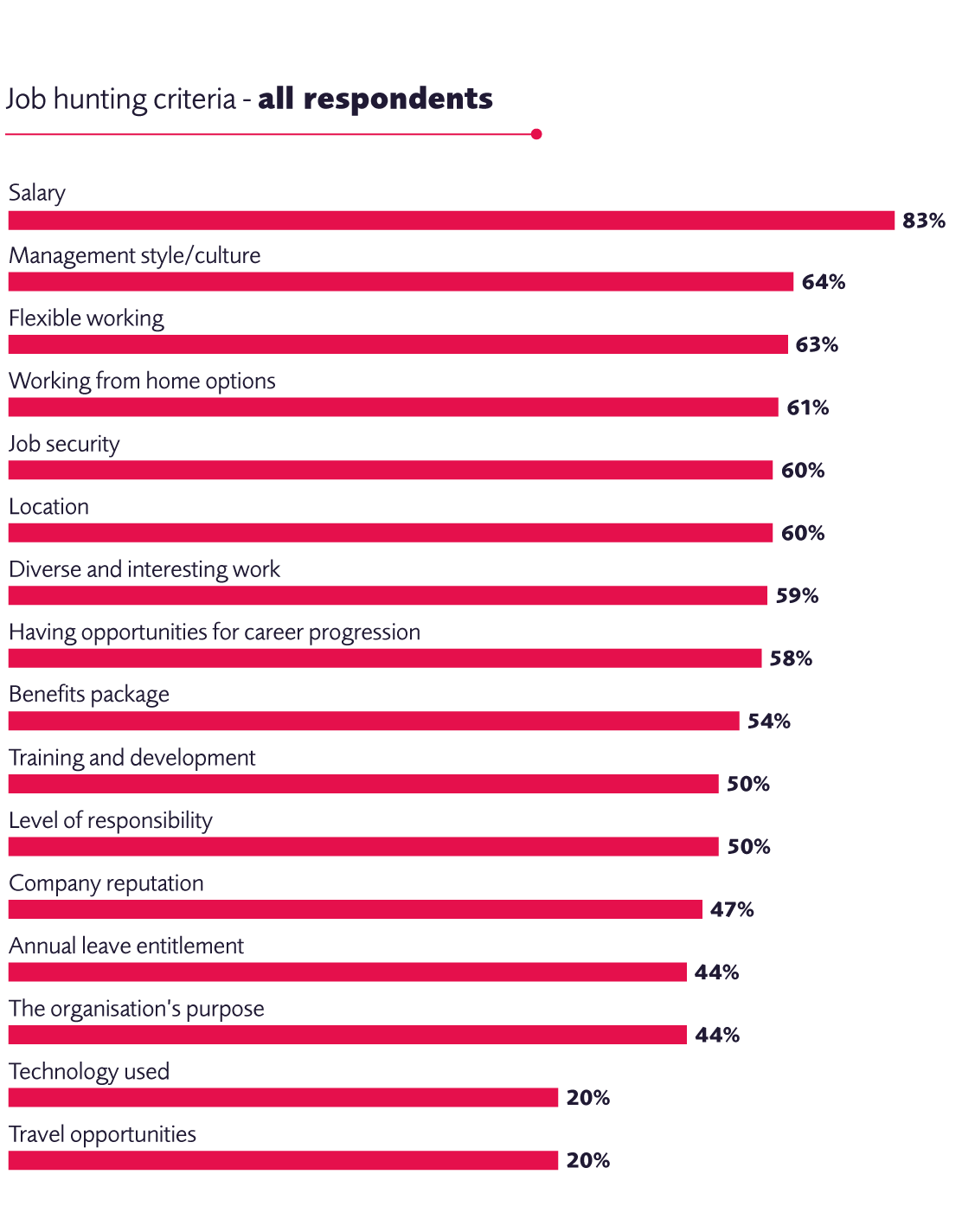
Encouraging talent into the profession
Last year saw a marked increase in the levels of new entrants to the project profession, reflecting the effective work done by employers, training providers and others in positioning project management as an attractive and rewarding career.
Unsurprisingly, that spike has been followed by a decrease in the numbers of new project professionals in the survey sample this time around. While one-fifth (20 per cent) had two years or less experience last year, only 14 per cent report the same this year. Instead, there has been an increase in those with 16 or more years’ experience, rising from 22 per cent to 30 percent this year.
Of course, no profession can hope to remain vital and healthy without a strong pipeline of new talent. And a growing majority of those surveyed believe that work must begin early to continue that. More than half (54 per cent) say that increasing the profession’s visibility in schools, colleges and universities is the best way to attract new talent, a slight increase from 52 per cent last year. There is also a growing belief that the financial rewards from a career in project management are an effective recruitment tool, identified by 18 per cent of respondents.
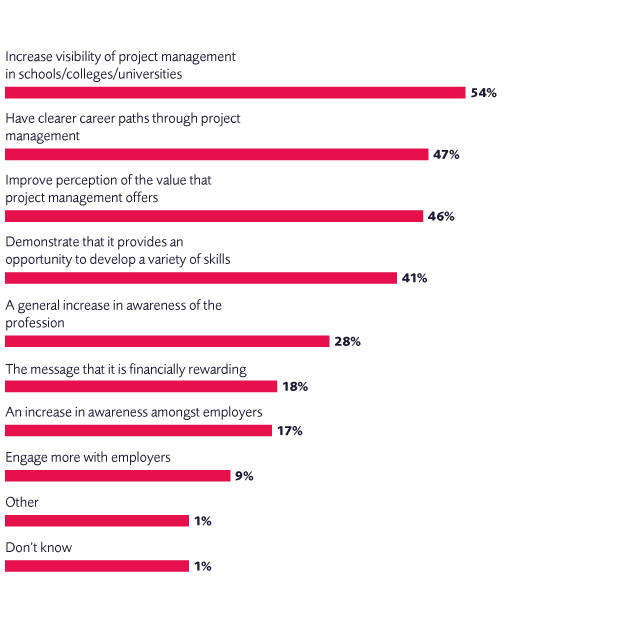
Economic confidence
The coronavirus pandemic has created economic anxiety across the world, in all sectors and professions. Project professionals are no exception. Unsurprisingly, optimism among professionals regarding the economic prospects for themselves over the next 12 months is sharply down: 56 per cent rate it as excellent or good, down from 65 per cent the previous year.
And that has hit those newest to the profession the hardest. The number of those in the 18-to-24-year-old bracket who rated their own prospects as excellent has dropped from 81 per cent to 72 per cent this year, the biggest single drop. However, despite that, they remain more optimistic than their older counterparts.
Naturally, many of the same sentiments extend to the prospects for organisations and the general state of the economy in which they operate. By both of these measures, optimism has dropped: only 51 per cent say their organisation’s economic prospects are good or excellent (down from 58 per cent last year), while just 15 per cent count themselves hopeful over the economy in the coming year, with 60 per cent being pessimistic. Indeed, only those outside the UK are maintaining broadly similar levels of optimism about the general economic picture as last year.
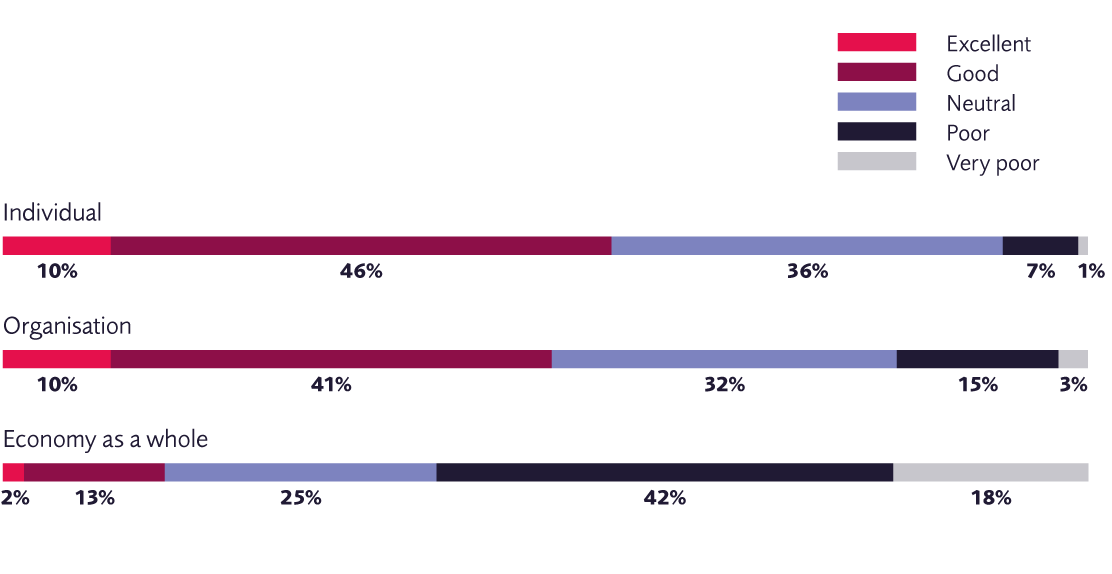
Extent to which poor economic prospects are a result of the coronavirus pandemic
Almost overwhelmingly, those who consider the economic prospects to be poor for themselves, their organisation and the economy highlight the coronavirus pandemic as the cause.
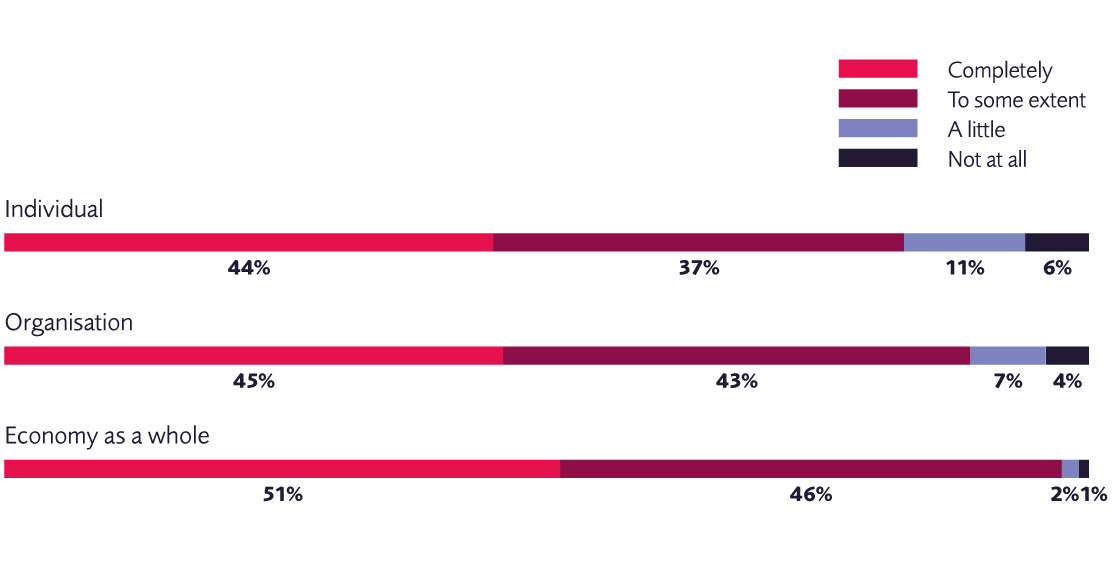
The future of the profession
Given the backdrop against which the survey was conducted – a global pandemic affecting the entire world, with uncertainty still rife – it isn’t surprising that confidence levels in the profession have taken a knock.
But despite that, the figures show that most (66 percent) agree that the project profession will be enhanced over the next five years. Clearly, this represents a drop from the previous year’s figure, but the fact that it remains the majority view is encouraging and demonstrates not only the relative stability of ongoing projects, but also the optimism of those delivering them. Indeed, the headline optimism figure of 66 per cent represents are turn to just above pre-pandemic levels of two years ago (65 per cent).
The fact that the proportion of those saying they believe the profession will be diminished in the next five years has only increased from three to four per cent does give a clear sense of the resilience among project professionals. That resilience is further underpinned by almost half citing coronavirus – something we can reasonably expect to recover from in the coming years – as the main factor.
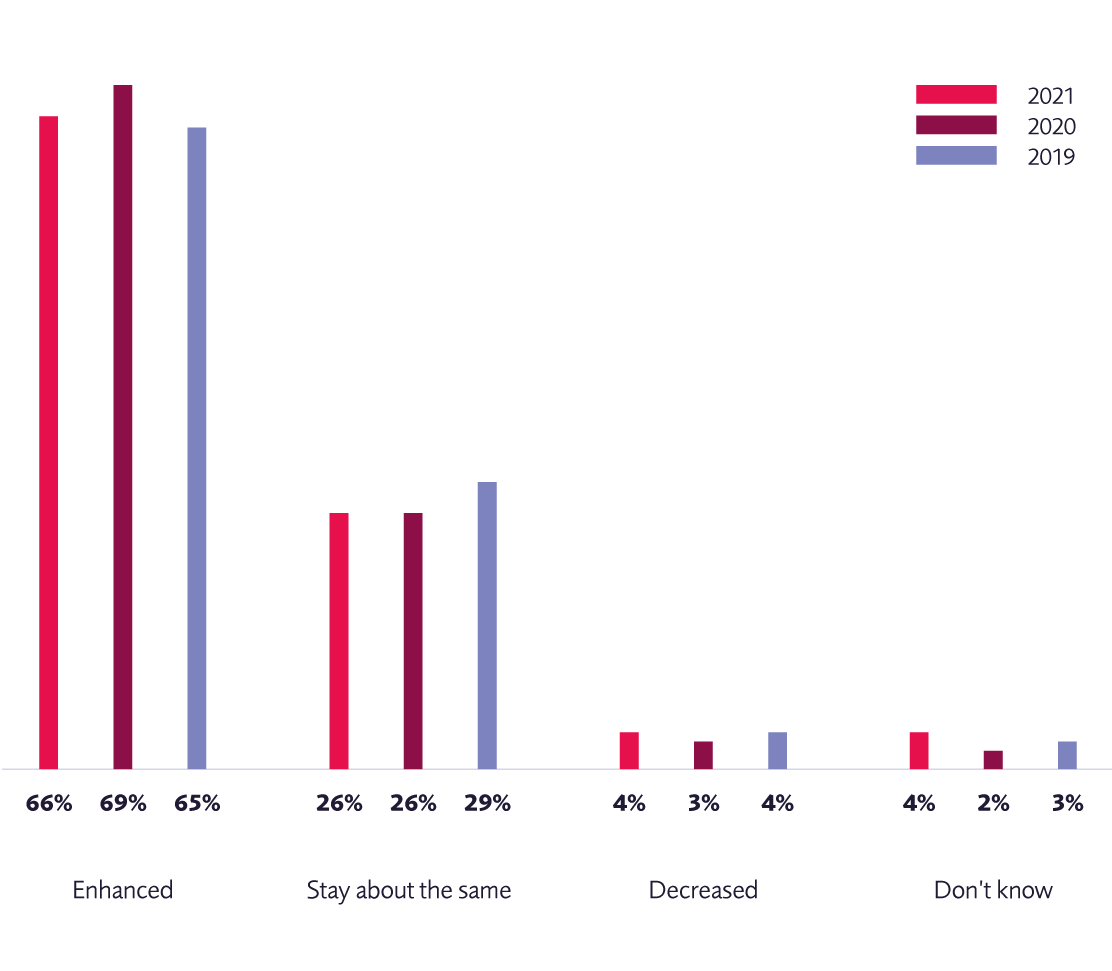
In summary: Short-term pain, long-term faith
There’s no escaping the serious impact of coronavirus; confidence levels have understandably been shaken. With so much uncertainty over current and future work prospects, it’s not surprising that some believe the impact will play out in the coming years. When only 15 per cent say they’re confident about the economy in general, it tells us a lot. Unsurprisingly, given that, most are opting to stick and not twist. Very few professionals are planning on moving jobs any time soon and are focusing on holding what they have.
And yet, faith in the profession’s ability to weather the storm remains strong – a clear majority still expect to see an enhanced profession and expect to see a good supply of jobs continue. We can say the same about their satisfaction levels too, with more than eight out of ten declaring themselves satisfied. That tells us that satisfaction among project professionals is built on a firm bedrock that not even the most seismic shock can shake.

Explore APM




